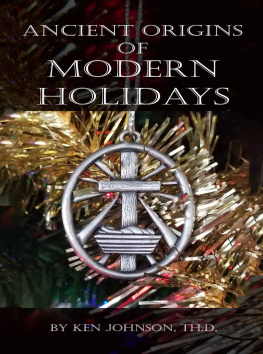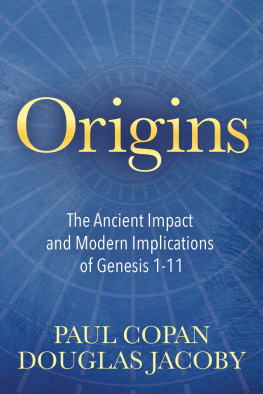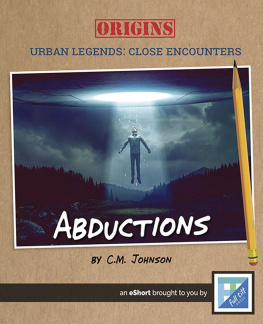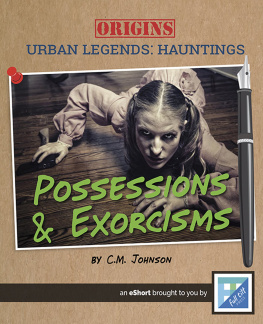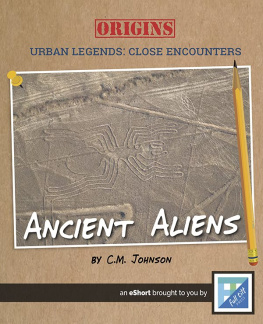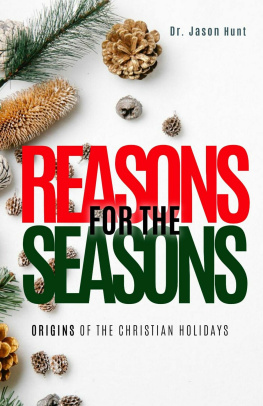Ken Johnson - Ancient Origins of Modern Holidays
Here you can read online Ken Johnson - Ancient Origins of Modern Holidays full text of the book (entire story) in english for free. Download pdf and epub, get meaning, cover and reviews about this ebook. year: 2019, publisher: Independently Published, genre: Religion. Description of the work, (preface) as well as reviews are available. Best literature library LitArk.com created for fans of good reading and offers a wide selection of genres:
Romance novel
Science fiction
Adventure
Detective
Science
History
Home and family
Prose
Art
Politics
Computer
Non-fiction
Religion
Business
Children
Humor
Choose a favorite category and find really read worthwhile books. Enjoy immersion in the world of imagination, feel the emotions of the characters or learn something new for yourself, make an fascinating discovery.
- Book:Ancient Origins of Modern Holidays
- Author:
- Publisher:Independently Published
- Genre:
- Year:2019
- Rating:3 / 5
- Favourites:Add to favourites
- Your mark:
- 60
- 1
- 2
- 3
- 4
- 5
Ancient Origins of Modern Holidays: summary, description and annotation
We offer to read an annotation, description, summary or preface (depends on what the author of the book "Ancient Origins of Modern Holidays" wrote himself). If you haven't found the necessary information about the book — write in the comments, we will try to find it.
Ancient Origins of Modern Holidays — read online for free the complete book (whole text) full work
Below is the text of the book, divided by pages. System saving the place of the last page read, allows you to conveniently read the book "Ancient Origins of Modern Holidays" online for free, without having to search again every time where you left off. Put a bookmark, and you can go to the page where you finished reading at any time.
Font size:
Interval:
Bookmark:
The reason I wanted to write about the holidays and their origin is because lately the subject of holidays has become quite controversial. When I was a teenager, everyone celebrated the holidays. Everyone greeted each other with Merry Christmas as they walked down the street. It was an American holiday, so, whether you were Christian, Jewish, Muslim, or an atheist, you still wished everyone a Merry Christmas because everyone cared about the happiness of his neighbors. The first time I ran across people who didnt like the holidays, they were the Jehovahs Witnesses. I found out later that this group claimed to be Christian but denied the doctrine of the Trinity. They specifically said Jesus was not God incarnate but an incarnation of the archangel Michael. The ancient church fathers taught that any group that was non-trinitarian was classified as a cult.
Jehovahs Witnesses
Jehovahs witnesses taught that all holidays were of pagan origin and that they were forbidden to participate in any holiday celebration. This also included celebrating an individuals birthday because this would be honoring yourself as a god in the eyes of Jehovah. They also considered saluting the American flag to be idolatry because the ritual of putting your hand on your heart and pledging your allegiance to an idea while gazing at the flag, made the pledge a type of prayer and the flag an idol representing what you think of as a god.
I thought that that was quite a stretch and quickly dismissed the whole concept as nonsense. Later I learned that there were a few other cults that taught similar ideas about the holidays.
To understand this issue, we need to define three terms that are often used interchangeably but are actually quite different. These are idolaters, pagans, and Gentiles.
Idolaters, Pagans, and Gentiles
An idolater is a person who uses an idol in rituals and/or prayer. An idol is a statue or graven image that an idolater bows in front of and prays to. A pagan is a person who believes in multiple gods. This is the opposite of Christianity and Judaism which believe that there is only one true God, the Creator of heaven and earth. A Gentile is a person who is not Jewish. All other nations of the earth are Gentiles. In ancient times most Gentiles were pagan, and many were idolaters. Some Gentiles were Noahides (called God-fearers in the New Testament) and still other Gentiles became full converts to Judaism. Today many Gentiles are Christian, and some Jews are Christian. So being a Jew or a Gentile is just what nation you are from. Being a pagan, idolater, or a Christian depends on what religion you believe in.
Pan-Babylonianism
For a short while, in the early part of the twentieth century, a theory circulated in archeology circles called Pan-Babylonianism. The term pan means everything, and Babylonian means of Babylonian origin. The theory stated that all near eastern religions came from Babylon, the cradle of civilization. While it was true that most Canaanite and west-semitic religions were very similar (the worship of Baal and Asherah), it was proven that the religions of the Canaanites and Babylonians were completely different.
Today in religious circles, the term Pan-Babylonian has come to mean a Christian who believes most holidays and customs originate from paganism and usually from Babylon and Nimrod. They, like the Jehovahs Witnesses, would say celebrating a birthday, Christmas, having a Christmas Tree, or other similar traditions has to be from paganism and therefore it would be a sin for a Christian to participate in them.
Most Pan-Babylonians focus on what we assume that the pagans did and try to avoid anything connected with those practices.
The vast majority of Protestants would agree with the Pan-Babylonians that idolatry is a sin and therefore break fellowship with Roman Catholics and Eastern Orthodox because of their insistence of using statues and icons in their worship. These same Protestants would disagree with the Pan-Babylonians on the issue that all traditions are pagan. They would say that some traditions are simply secular and not sinful.
Fourth of July Example
Let me give an example of pagan traditions vs. secular traditions. The United States of America was founded on July 4, 1776. The Fourth of July is now a national holiday. Americans take off work to celebrate the founding of our country, the ideals incorporated in the Declaration of Independence, the Constitution, and the concepts of freedom and the republic. Often Americans celebrate with a barbeque, apple pie, and usually there is some sort of fireworks at dusk. These are all secular traditions. They have nothing to do with a god or goddess. Now suppose that a hundred years later a cult sprung up that deified our first president, George Washington. Lets say that this cult set up shrines with a statue of George Washington and prayed to him, sacrificed animals to him, and committed acts of fornication in his honor. All this was done at these shrines on the Fourth of July. Now, lets say that after another hundred years had passed, the cult ceased to exist and was all but forgotten.
Someone with a heart of a Pan-Babylonian would find out about the cult and assume the cult founded the holiday and everything about it was pagan. They would try to convince all Christians to abandon everything associated with the Fourth of July because they did not know the true origin of the holiday.
Someone with the heart of a regular Protestant would destroy all the cultic shrines and idols of George Washington, if they were still around, because those things would be pagan. However, they would not destroy a monument of George Washington because it is not an idol (it was never used in religious worship or prayed to). They would continue to celebrate all of the old traditions in honor of what the holiday originally stood for.
Rightly Dividing Tradition
The apostle Paul taught in 1 Corinthians 10 that Christians cannot participate in pagan ceremonies; but then he taught in 1 Corinthians 11 that the secular tradition of women wearing head coverings, while not a church law, should be practiced. Since the tradition was not pagan or idolatrous it was not forbidden, and it would help the Christian witness in that pagan society.
So, if celebrating Christmas with Christmas trees is pagan, we need to do away with it. If the holiday is Christian, we absolutely need to celebrate it for the purpose of witnessing to unbelievers. If parts of the traditions are Christian and parts are pagan, we must remove the paganism and use the Christian parts to witness.
Conclusion
What we want to accomplish in this book is to point out exactly what idolatry and paganism are, and what is, and is not, permissible for a Christian. We want to do this by using the Bible, Jewish law, the church fathers, and the Dead Sea Scrolls.
In the next chapter we will look at what idolatry is, and is not, from the Old Testament and Jewish law. In the following chapters we will study what the apostle Paul said about this issue. Then we will look at the ancient histories of the holidays from the Dead Sea Scrolls. Finally, we will try to trace back, as far as we can, the ancient histories of each holiday.
We must first ask the question, what is idolatry? We find the description in the Ten Commandments, recorded in Exodus 20 and Deuteronomy 5.
You shall not make to yourselves any graven image, or any likeness of anything that is in the heavens above, or that is in the earth beneath, or that is in the water under the earth. You shall not bow yourself down to them, nor serve them.
Font size:
Interval:
Bookmark:
Similar books «Ancient Origins of Modern Holidays»
Look at similar books to Ancient Origins of Modern Holidays. We have selected literature similar in name and meaning in the hope of providing readers with more options to find new, interesting, not yet read works.
Discussion, reviews of the book Ancient Origins of Modern Holidays and just readers' own opinions. Leave your comments, write what you think about the work, its meaning or the main characters. Specify what exactly you liked and what you didn't like, and why you think so.

